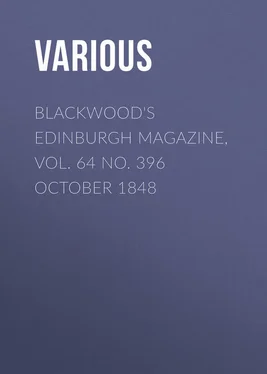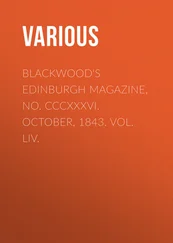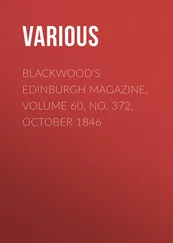Various - Blackwood's Edinburgh Magazine, Vol. 64 No. 396 October 1848
Здесь есть возможность читать онлайн «Various - Blackwood's Edinburgh Magazine, Vol. 64 No. 396 October 1848» — ознакомительный отрывок электронной книги совершенно бесплатно, а после прочтения отрывка купить полную версию. В некоторых случаях можно слушать аудио, скачать через торрент в формате fb2 и присутствует краткое содержание. Издательство: Иностранный паблик, Жанр: periodic, foreign_edu, Путешествия и география, на английском языке. Описание произведения, (предисловие) а так же отзывы посетителей доступны на портале библиотеки ЛибКат.
- Название:Blackwood's Edinburgh Magazine, Vol. 64 No. 396 October 1848
- Автор:
- Издательство:Иностранный паблик
- Жанр:
- Год:неизвестен
- ISBN:нет данных
- Рейтинг книги:4 / 5. Голосов: 1
-
Избранное:Добавить в избранное
- Отзывы:
-
Ваша оценка:
- 80
- 1
- 2
- 3
- 4
- 5
Blackwood's Edinburgh Magazine, Vol. 64 No. 396 October 1848: краткое содержание, описание и аннотация
Предлагаем к чтению аннотацию, описание, краткое содержание или предисловие (зависит от того, что написал сам автор книги «Blackwood's Edinburgh Magazine, Vol. 64 No. 396 October 1848»). Если вы не нашли необходимую информацию о книге — напишите в комментариях, мы постараемся отыскать её.
Blackwood's Edinburgh Magazine, Vol. 64 No. 396 October 1848 — читать онлайн ознакомительный отрывок
Ниже представлен текст книги, разбитый по страницам. Система сохранения места последней прочитанной страницы, позволяет с удобством читать онлайн бесплатно книгу «Blackwood's Edinburgh Magazine, Vol. 64 No. 396 October 1848», без необходимости каждый раз заново искать на чём Вы остановились. Поставьте закладку, и сможете в любой момент перейти на страницу, на которой закончили чтение.
Интервал:
Закладка:
A great contrast to these young men was Sir Sedley Beaudesert, who was pointedly kind to me, and whose bachelor's house was always open to me after noon; Sir Sedley was visible to no one, but his valet, before that hour. A perfect bachelor's house it was, too – with its windows opening on the Park, and sofas niched into the windows, on which you might loll at your ease, like the philosopher in Lucretius, —
"Despicere unde queas alios, passimque videre,
Errare," —
And see the gay crowds ride to and fro Rotten Row – without the fatigue of joining them, especially if the wind was in the east.
There was no affectation of costliness, or what the French and the upholsterers call recherché , about the rooms, but a wonderful accumulation of comfort. Every patent chair that proffered a variety in the art of lounging, found its place there; and near every chair a little table, on which you might deposit your book or your coffee-cup, without the trouble of moving more than your hand. In winter, nothing warmer than the quilted curtains and Axminster carpets can be conceived. In summer, nothing airier and cooler than the muslin draperies and the Indian mattings. And I defy a man to know to what perfection dinner may be brought, unless he had dined with Sir Sedley Beaudesert. Certainly, if that distinguished personage had but been an egotist, he had been the happiest of men. But, unfortunately for him, he was singularly amiable and kind-hearted. He had the bonne digestion , but not the other requisite for worldly felicity – the mauvais cœur . He felt a sincere pity for every one else who lived in rooms without patent chairs and little coffee tables – whose windows did not look on the Park, with sofas niched into their recesses. As Henry IV. wished every man to have his pot au feu , so Sir Sedley Beaudesert, if he could have had his way, would have every man served with an early cucumber for his fish, and a caraffe of iced water by the side of his bread and cheese. He thus evinced on politics a naïve simplicity, which delightfully contrasted his acuteness on matters of taste. I remember his saying, in a discussion on the Beer Bill, "The poor ought not to be allowed to drink beer, it is so particularly rheumatic! The best drink in hard work is dry champagne – (not mousseux .) I found that out when I used to shoot on the moors."
Indolent as Sir Sedley was, he had contrived to open an extraordinary number of drains on his great wealth.
First, as a landed proprietor, there was no end to applications from distressed farmers, aged poor, benefit societies, and poachers he had thrown out of employment by giving up his preserves to please his tenants.
Next, as a man of pleasure, the whole race of womankind had legitimate demands on him. From a distressed duchess, whose picture lay perdu under a secret spring of his snuff-box, to a decayed laundress, to whom he might have paid a compliment on the perfect involutions of a frill, it was quite sufficient to be a daughter of Eve to establish a just claim on Sir Sedley's inheritance from Adam.
Again, as an amateur of art, and a respectful servant of every muse, all whom the public had failed to patronise – painter, actor, poet, musician – turned, like dying sun-flowers to the sun, towards the pitying smile of Sir Sedley Beaudesert. Add to these the general miscellaneous multitude, who 'had heard of Sir Sedley's high character for benevolence,' and one may well suppose what a very costly reputation he had set up. In fact, though Sir Sedley could not spend on what might fairly be called "himself," a fifth part of his princely income, I have no doubt that he found it difficult to make both ends meet at the close of the year. That he did so, he owed perhaps to two rules which his philosophy had peremptorily adopted. He never made debts, and he never gambled. For both these admirable aberrations from the ordinary routine of fine gentlemen, I believe he was indebted to the softness of his disposition. He had a great compassion for a wretch who was dunned. "Poor fellow!" he would say, "it must be so painful to him to pass his life in saying No." So little did he know about that class of promisers, – as if a man dunned ever said No! As Beau Brummell, when asked if he was fond of vegetables, owned that he had once eaten a pea, so Sir Sedley Beaudesert owned that he had once played high at piquet. "I was so unlucky as to win," said he, referring to that indiscretion, "and I shall never forget the anguish on the face of the man who paid me. Unless I could always lose, it would be a perfect purgatory to play."
Now nothing could be more different in their kinds of benevolence than Sir Sedley and Mr Trevanion. Mr Trevanion had a great contempt for individual charity. He rarely put his hand into his purse – he drew a great cheque on his bankers. Was a congregation without a church, or a village without a school, or a river without a bridge, Mr Trevanion set to work on calculations, found out the exact sum required by an algebraic x–y , and paid it as he would have paid his butcher. It must be owned that the distress of a man, whom he allowed to be deserving, did not appeal to him in vain. But it is astonishing how little he spent in that way. For it was hard, indeed, to convince Mr Trevanion that a deserving man ever was in such distress as to want charity.
That Trevanion, nevertheless, did infinitely more real good than Sir Sedley, I believe; but he did it as a mental operation – by no means as an impulse from the heart. I am sorry to say that the main difference was this, – distress always seemed to accumulate round Sir Sedley, and vanish from the presence of Trevanion. Where the last came, with his busy, active, searching mind, energy woke, improvement sprang up. Where the first came, with his warm kind heart, a kind of torpor spread under its rays; people lay down and basked in the liberal sunshine. Nature in one broke forth like a brisk sturdy winter, in the other like a lazy Italian summer. Winter is an excellent invigorator, no doubt, but we all love summer better.
Now, it is a proof how loveable Sir Sedley was, that I loved him, and yet was jealous of him. Of all the satellites round my fair Cynthia, Fanny Trevanion, I dreaded most this amiable luminary. It was in vain for me to say with the insolence of youth that Sir Sedley Beaudesert was of the same age as Fanny's father; – to see them together he might have passed for Trevanion's son. No one amongst the younger generation was half so handsome as Sir Sedley Beaudesert. He might be eclipsed at first sight by the showy effect of more redundant locks and more brilliant bloom. But he had but to speak, to smile, in order to throw a whole cohort of dandies into the shade. It was the expression of his countenance that was so bewitching; there was something so kindly in its easy candour, its benign good-nature. And he understood women so well! He flattered their foibles so insensibly; he commanded their affection with so gracious a dignity. Above all, what with his accomplishments, his peculiar reputation, his long celibacy, and the soft melancholy of his sentiments, he always contrived to interest them. There was not a charming woman by whom this charming man did not seem just on the point of being caught! It was like the sight of a splendid trout in a transparent stream, sailing pensively to and fro your fly, in a will and a won't sort of way. Such a trout! it would be a thousand pities to leave him, when evidently so well disposed! That trout, fair maid, or gentle widow, would have kept you – whipping the stream and dragging the fly – from morn to dewy eve. Certainly I don't wish worse to my bitterest foe of five-and-twenty than such a rival as Sedley Beaudesert at seven-and-forty.
Читать дальшеИнтервал:
Закладка:
Похожие книги на «Blackwood's Edinburgh Magazine, Vol. 64 No. 396 October 1848»
Представляем Вашему вниманию похожие книги на «Blackwood's Edinburgh Magazine, Vol. 64 No. 396 October 1848» списком для выбора. Мы отобрали схожую по названию и смыслу литературу в надежде предоставить читателям больше вариантов отыскать новые, интересные, ещё непрочитанные произведения.
Обсуждение, отзывы о книге «Blackwood's Edinburgh Magazine, Vol. 64 No. 396 October 1848» и просто собственные мнения читателей. Оставьте ваши комментарии, напишите, что Вы думаете о произведении, его смысле или главных героях. Укажите что конкретно понравилось, а что нет, и почему Вы так считаете.












